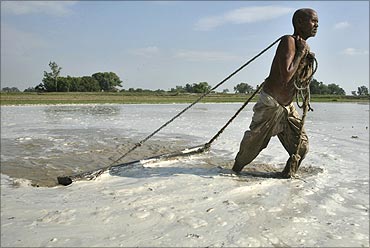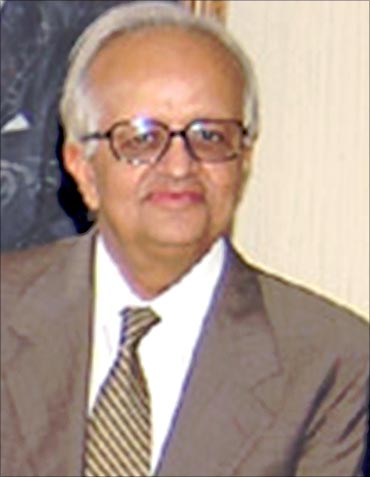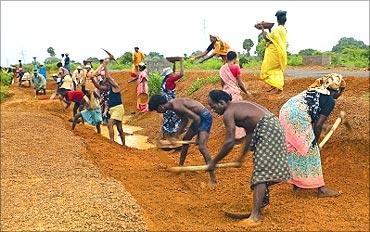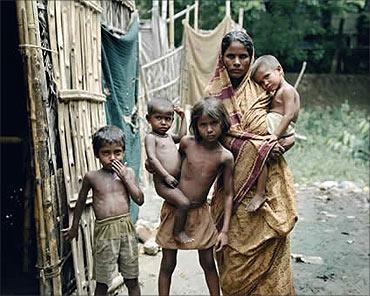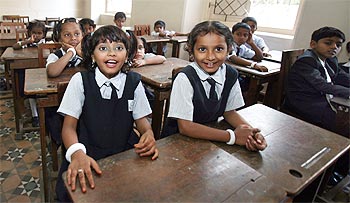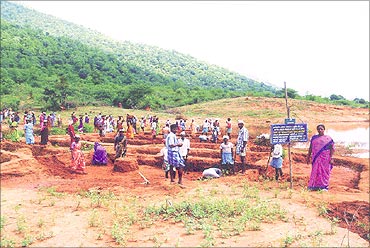 | « Back to article | Print this article |
Lack of development in states? Blame the Centre
Last updated on: March 24, 2011 10:47 IST
Should the Central government run schools, cr ches, pre-schools, dispensaries, employment schemes, the buying and selling of food grains, and build houses, not to speak of selling milk as it does in Delhi? Though the states seem to have taken it as their fate to have schemes on state subjects like education, agriculture and so on tailored for them by the Centre, as if in distrust of the states' capability to think for themselves, the top down approach of development carried out over 60 years has not obtained great results in human development. Click NEXT to read on
Lack of development in states? Blame the Centre
Last updated on: March 24, 2011 10:47 IST
The Public Interest Foundation set up by retired bureaucrats like Bimal Jalan, former Governor of the Reserve Bank of India, evaluating the National Rural Employment Guarantee Scheme a year ago arrived at a similar conclusion. While it does not say the Centre should wind up its set of 'schemes', it says it should leave them to the states to enforce according to their liking. It says the NREGA should be implemented by states not as a Central scheme, but as a state scheme mandated under a Central Act. The Act, it says, should be amended to omit all prescriptions and details on implementation and instead provide flexibility to states. Click NEXT to read on
Lack of development in states? Blame the Centre
Last updated on: March 24, 2011 10:47 IST
It further suggests that states should conceive the scheme in integration with other rural development schemes.
So the rural staff should be common for all schemes rather than be separate for the NREGA. But, again, that would be interfering too, much against the PIF's own prescription. The foundation said the scheme which provides or promises 100 days of wage employment a year per rural household has a rigid framework of implementation and the procedures are too complex.Click NEXT to read on
Lack of development in states? Blame the Centre
Last updated on: March 24, 2011 10:47 IST
The implementation process is very bureaucratic and it suggested steps to simplify it.
Instead of sending funds to 600 districts, it suggested that funds be sent to states directly and followed up with audits. Another report called the PAISA report by the Annual Survey of Education and Accountability Initiative implies a similar conclusion, that is Centrally prescribed funding is digested poorly by states.Click NEXT to read on
Lack of development in states? Blame the Centre
Last updated on: March 24, 2011 10:47 IST
In its second annual survey looking at the use of Central grants by 13,000 government schools in the Sarva Shiksha Abhiyan, it saw the Centre groping in the dark and money being largely wasted.
In FY 2009-10, the total SSA allocation for the country (including the state share) was Rs 27, 876.29 crore. School grants coming from the Centre accounted for Rs 1,635.32 crore (about six per cent) of this total allocation. It is meant for infrastructure, text books and needs other than salaries. While 80 per cent schools reported having got the grants, nearly 64 per cent spent them mostly on whitewashing.Click NEXT to read on
Lack of development in states? Blame the Centre
Last updated on: March 24, 2011 10:47 IST
States were left with 30 per cent unspent funds. The funds were not used for essentials like black boards or text books or water facilities, it said. The report does not suggest the solution while underlining the disconnect between Central allocation and state use. Bimal Jalan says the Centre should make policies and reimburse the expenses of states but not prescribe how the money is spent or how the policy is implemented.
Click NEXT to read on
Lack of development in states? Blame the Centre
Last updated on: March 24, 2011 10:47 IST
He says the Centre, for instance, should not prescribe wage rates for the whole country under the NREGA. It can commit itself to paying a certain amount and let the states decide the rates. So, if the Uttar Pradesh government is capable of spending state funds worth Rs 11,185 crore (Rs 111.85 billion) on education (2009-2010) without Central prescriptions, probably it should be allowed to spend the Central grant of Rs 2,000 crore (Rs 20 billion) too, without much ado by Delhi.
